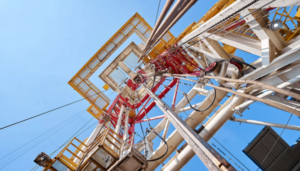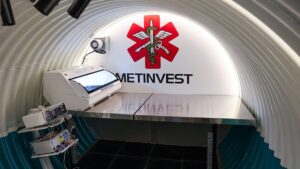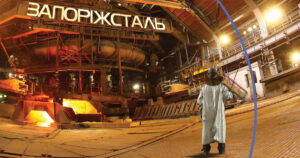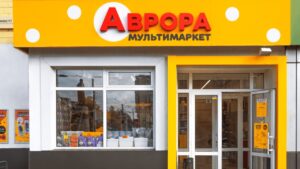
JSC Ukrgasvydobuvannya (UGV) has launched a high-performance well in Poltava region with a daily production rate of 274 thousand cubic meters of gas.
According to the company’s website, the new well was drilled as an appraisal and production well using a hydrocarbon-based mud. Its peculiarity is that the planned bottom hole is located directly under a settlement.
“The idea of drilling this well belongs to Andriy Tiro from UkrNDIGas, he assessed the field’s production potential and found a remote site for its drilling. At the same time, the development team has prepared a detailed geological and technical feasibility study,” said Serhiy Lagno, UGV CEO, as quoted on the website.
He added that the well was drilled thanks to modern drilling equipment, advanced drilling technologies and the skill of Ukrburgaz drilling department (UGV division – IF-U) specialists, who completed a rather difficult task in 4 months: they drilled a well with a bottom hole reach of more than 1.3 thousand meters.
In turn, the specialists of the Ukrgazpromgeofizyka geophysical department (UGV branch – IF-U) performed complex logging operations and determined the depth of gas-bearing formations in the conditions of a large wellbore angle.
“The commissioning of the new well increased gas production per day at this field by 17%. This means that the field has prospects for further drilling, despite its depletion and age,” commented the head of UGV.
As the company recalled, Ukrgasvydobuvannya drilled 50 wells in 6 months of 2024, of which 41 were put into operation.
As reported, in 2023, Ukrgasvydobuvannya launched 86 new wells, 24 of which had an initial flow rate of more than 100 thousand cubic meters, and in January-May 2024, 36 new gas wells, 11 of which are highly productive.
In 2023, the company produced 13.224 bcm of commercial gas, which is 0.679 bcm more than in 2022.
“In January-June 2024, Ukrgasvydobuvannya increased natural gas production (commercial) by 8.8% compared to the same period in 2023 – up to 6.913 bcm.
NJSC Naftogaz of Ukraine owns 100% of Ukrgasvydobuvannya shares.

Metinvest Group, as part of Rinat Akhmetov’s Steel Front military initiative, has built the country’s first underground hospital for the Ministry of Defense of Ukraine, in coordination with the Vostok Medical Force, to provide primary medical care and stabilize soldiers after they are injured on the front line, investing more than UAH 20 million, the group said in a press release on Tuesday.
For its part, the Ministry of Defense noted in a post on its website that the hospital was the first in a large-scale project implemented by the ministry in coordination with the Vostok Medical Force, and in total it involves the construction of more than two dozen underground staging areas.
It is specified that the first facility is located near the front line and is designed to provide medical care to Ukrainian defenders in the safest possible conditions. The hospital was built on the basis of six enlarged steel bunkers, each of which is 7.6 meters long and 2.5 meters in diameter, developed by Metinvest. Ventilation, water supply, drainage and alternative power sources have been installed to ensure the facility’s operation.
Additional safety measures were taken during the installation of the underground hospital, including the addition of high-powered electronic warfare systems and alternative power sources.
“Such underground stations are critical for saving the lives of our military… This is the first step in a large-scale project that will strengthen our medical infrastructure and allow us to more effectively support our defenders on the front line,” said Defense Minister Rustem Umerov.
“Metinvest clarified that the hospital’s staffing level corresponds to the level of a second echelon field hospital (Role/Echelon 2) in accordance with NATO standards, and the investment included not only the cost of building the hospital but also the cost of its equipment.
“A medical hospital many meters underground is the most ambitious and complex project we have had to implement since the beginning of the full-scale invasion as part of Rinat Akhmetov’s Steel Front initiative,” said Metinvest’s Chief Operating Officer Alexander Mironenko.
It is noted that the steel underground hospital is not inferior to civilian hospitals in terms of medical equipment.
In particular, Metinvest has equipped the hospital with oxygen concentrators, a ventilator, cardiac monitors, defibrillators, operating equipment and lighting, sterilizers, patient heating systems, and medical furniture worth more than UAH 7 million.
“This underground hospital is the best of the stabilization centers. It will allow us to provide medical care to more than 100 patients a day, saving hundreds of lives of our heroes. I hope that the number of such facilities will increase,” said Roman Kuzev, acting commander of the Medical Forces ‘East’.
Tovkachevsky Mining and Processing Plant (TMP, Pershotravneve, Zhytomyr region) intends to supply quartzite and crushed stone to WENGA SPOLKA Z OGRANICZONA ODPOWIEDZIALNOSCIA (Poland) for a total of EUR 2 million.
According to the company’s announcement in the NSSMC’s information disclosure system, on September 2 this year, the Supervisory Board of TGOK gave its consent to the Management Board to conduct a significant transaction – the conclusion of a supply agreement between the company and WENGA SPOLKA Z OGRANICZONA ODPOWIEDZIALNOSCIA (Poland).
At the same time, it is specified that the contract is for the supply of the following quartzite products: quartzite TK 97-100 fraction 25-120 mm, 25-100 mm, 25-100 mm, 2 mm; crushed stone fraction 5-10 mm, 5-40 mm, 20-40 mm, 25-60 mm, with a total contract value of EUR 2 million.
“To entrust the Chairman of the Management Board of the company to perform all actions and sign all documents necessary to conclude the above-mentioned agreement for the supply of quartzite products with WENGA SPOLKA Z OGRANICZONA ODPOWIEDZIALNOSCIA (Poland). The market value of the subject of the agreement is EUR 2 million, at the NBU exchange rate as of September 2, 2024, it amounts to UAH 91 million 3.6 thousand,” the company said in a statement.
TGOK is a quartzite mining, processing and beneficiation company. It is the main supplier of raw materials for the production of ferroalloys, refractories and dynamite in Ukraine.
TGOK develops the Tovkachivska area of the Ovruch quartzite deposit located in Pershotravneve village using the open-pit method.
According to the second quarter of 2024, Navaro Development Limited owns 5.1898% of the company’s shares, Lucrino Investments Limited – 9%, Mantara Holdings Limited – 72.0629%, Duxton Holdings Limited (all Cyprus) – 12.1891%.The company’s authorized capital is UAH 1.6 million, the share price is UAH 2.25.

Novus Ukraine LLC has opened a new supermarket in Kyiv, in the Seven residential complex (18 Dniprovska embankment), the retailer’s press service reports.
This supermarket is reportedly the first new one to open in 2024. Its total area is 1046 square meters, with a sales area of 733 square meters.
“We are pleased to have the opportunity to continue developing our company in such a difficult time. Our goal is to create a comfortable space and meet the needs of our customers. The store is located in a residential complex, so for many residents it will become a “home” market where they can spend a lot of time,” Mark Petkevich, CEO of Novus, was quoted in the release as saying.
The store is equipped with a modern bakery, where fresh bread and other bakery products will be baked daily. Particular attention is paid to a wide range of chilled meat and ready-to-eat meals of its own production, which can become a full-fledged alternative to cooking at home.
“We strive not only to satisfy the basic needs of our customers, but also to offer a special gastronomic experience that will become an alternative to home cooking,” Novus adds.
Novus Ukraine LLC was established in 2008 and opened the first Novus supermarket in the country the same year. As of August 2024, the retailer’s network includes more than 80 Novus and 21 Mi Market stores in Ukraine.
The Novus supermarket chain is developed by BT Invest (Lithuania), a company established in 2008 by former Sandora shareholders Raimondas Tumenas and the late Igor Bezzub.
According to Opendatabot, as of July 2021, the owner of Novus Ukraine with a 100% stake in the authorized capital was Consul Trade House CJSC (Vilnius, Lithuania). The ultimate beneficiaries are Marina Poznyakova, Agne Ruzgienė, and Raimondas Tumenas.
According to the company’s financial results, in 2023, its revenue increased by 47% to UAH 23.6 billion, while its net loss decreased by 87% to UAH 310.7 million.

In January-August this year, Zaporizhstal Iron and Steel Works increased its rolled steel output by 32.6% year-on-year to 1 million 644.4 thousand tons from 1 million 240.4 thousand tons.
According to the company, steel production during this period increased by 31.6% to 1 million 973.7 thousand tons, and pig iron production by 23% to 2.049 million tons.
In August, Zaporizhstal produced 259.5 thousand tons of iron, 236.8 thousand tons of steel, and shipped 214.2 thousand tons of rolled products, while in July it smelted 261.9 thousand tons of iron, 250.8 thousand tons of steel, and shipped 202 thousand tons of rolled products.
It is recalled that in 2023, the plant operated at an average of 70% of its capacity.
As reported, in 2023, Zaporizhstal increased its rolled products output by 57.2% compared to 2022, up to 2 million 54.7 thousand tons, steel by 65.4%, up to 2 million 466.9 thousand tons, and pig iron by 35.3%, up to 2 million 718.9 thousand tons.
“Zaporizhstal is one of the largest industrial enterprises in Ukraine, whose products are in great demand among consumers both in the domestic market and in many countries of the world.
“Zaporizhstal is in the process of integration into Metinvest Group, whose major shareholders are System Capital Management (71.24%) and Smart Holding Group (23.76%).
Metinvest Holding LLC is the management company of Metinvest Group.

Aurora, Ukraine’s largest one dollar store chain, opened eight new stores across Ukraine on the eve of the fall, said Ruslan Kudrya, the chain’s development director.
“Today we have surpassed ourselves. At the end of the week, month and summer, we opened eight new stores across Ukraine in one day – the previous record was six,” he wrote on Facebook on August 31.
As specified in the message, three stores were opened in Kyiv, one in Chernihiv, Dnipro, Kryvyi Rih, Morshyn and Dykanka village (Poltava region).
As reported, Aurora intends to open 400 new stores by the end of this year and reach 2,000 outlets in Ukraine by the end of next year.
“Aurora was founded in 2011 by Lev Zhidenko, Taras Panasenko and Lesya Klymenko. The head office of the Aurora retail chain is located in Poltava. Today, the chain has more than 1400 stores in Ukraine and 25 in Romania.
According to Opendatabot, the owner of Vygidna Kupilka LLC, which develops the chain, is listed as Cyprus-based Aurority Investments Limited, with Zhydenko as its beneficiary. The Cypriot company also owns Prior Development LLC, Seven A LLC, Promyslova 9 LLC, and Tak LLC.
At the end of 2023, the network’s net profit amounted to UAH 4.1 billion, and net income – UAH 27 billion.